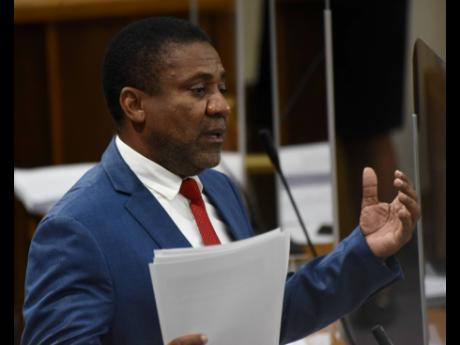Opposition voices concern that some JPS customers paying more
Opposition spokesman on science, energy and technology, Phillip Paulwell has raised concerns that some customers of the Jamaica Power Service Company (JPS) have been bearing the burden of cost as other customers leave the grid to utilise alternate facilities.
“A significant number of large customers are utilising natural gas to generate their own electricity. There is one supplier of natural gas so far in Jamaica and it is my understanding that when that supplier and infrastructure was being created, the JPSCo customers are currently paying for that,” Paulwell said in a Joint Select Committee meeting on the Electricity Act on Wednesday, March 15.
But chief technical director of energy in the Ministry of Science, Energy and Technology, Brian Richardson, clarified that the fixed capital cost of LNG also included the infrastructure referred to by Paulwell. He told the meeting that the fixed cost is what pays for the electricity and that the infrastructure was built into the cost of the generation plant. He further outlined that the infrastructure is paid for by anyone who remains connected on the grid.
However, Paulwell insisted that large customers who are getting natural gas from that same facility should also pay, and the Ministry needs to ensure that this is so.
Minister of Science, Energy and Technology, Daryl Vaz agreed that this is something that needs to be addressed, telling members that he intends to have further discussions on this issue.
But committee member Fitz Jackson was not pleased with that response, and expressed his displeasure that the committee keeps having these fruitless discussions.
“It would appear in a very vivid way that there is no intention to implement that policy position, only to acknowledge it as a policy, but not to act on it. And therefore the comfort that consumers would have had, that they would be compensated for what they have paid for, by reduction or which other mechanisms that would have been chosen, but there would have been some benefit, and it is only the new users who are getting the benefit of their sacrifice,” he said.
Acknowledging the member’s frustration, Vaz said that this issue often takes the form of a private contractual arrangement between the LNG supplier and the customer. However, the minister committed to address the issue, telling the committee that he will give an update within 60-90 days.
IMPROVE TRANSPARENCY
The minister also reiterated his position that the country could not afford an unbundling of the electricity market. Pointing to statistics from the World Bank which stated that a country needs a system size of at least 3000 megawatts at peak demand, a power market trading value of over 1 billion dollars to justify investments in the needed energy trading platform and have at least 20 terawatt hours of annual sales, he said Jamaica’s grid is a little 600 megawatts at peak demand by comparison (and) has only three terawatt hours of sale per annum.
The minister also indicated that this change would be costly for Jamaican taxpayers who would now have to bear the financial costs related to the termination of JPS current licence and restructuring of the electricity legal and regulatory framework to accommodate an unbundled system.
“If Jamaica forces unbundling then the restructuring cost that will be borne by the JPS would either be recovered from the government of Jamaica or the remaining customers on the grid.”
Instead, he said his ministry will improve transparency in the process.
“With or without JPS, Jamaica’s small electricity market cannot support unbundling. The ministry will set up systems to hold itself accountable and to give a work plan with timelines and updates to the citizenry in order to demonstrate its progress as we chart the way forward,” he said.
And indicating that the process to review the Electricity Act 2015 will be expedited, Vaz outlined that increased focus will be placed on the replacement of existing generation capacity with renewables to achieve 50 per cent renewables by 2050 target.
“We’re at the opportune time right now to be able to do the appropriate step based on our understanding of the grid. And I think having renewables being the dominant procurement going forward should be the pathway that Jamaica goes on,” Richardson said, “Every time we delay we are causing our own issues as a country and our economic security is at risk as well.”


